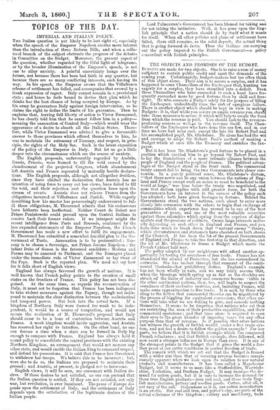TOPICS OF THE DAY.
IMPERIAL AND ITALIAN POLICY.
TKE Italian question is not likely to be lost sight of, especially when the speech of the Emperor Napoleon excites more interest than the introduction of three Reform Bills, and when a colla- teral branch of the subject obstructs the progress of the debates in Committee on the Budget. Moreover, the present aspect of the question, whether regarded by the fitful light of telegrams, or by the broader illumination of the Emperor's speech, is not one to allay anxiety. A painful uncertainty hangs over the future, not because there has been bad faith in any quarter, but because there are so many conflicting interests, each forcing its way. In his speech, the Emperor avows that the Villafranca scheme of settlement has failed, and accompanies that avowal by a frank expression of regret. Italy cannot remain in a provisional state ; and hence he feels bound to devise that plan which he thinks has the best chance of being accepted by Europe. As by Ms army he guarantees Italy against foreign intervention, so he claims the right to define the limits of his guarantee. Then he explains that, leaving full liberty of action to Victor Emmanuel, he has clearly told him that he cannot follow him in a policy— meaning the annexation of Central Italy—which would wear the appearance of a desire to absorb all the Italian States. There- fore, while Victor Emmanuel was advised to give a favourable answer to those provinces which offered themselves to him, he
was to maintain the autonomy of Tuscany, and respect, in prin- ciple, the rights of the Holy See. Such is the latest exposition of the policy of the Emperor in Italy. But let us go a little deeper into the circumstances which are the source of anxiety.
The English proposals, unfavourably regarded by Austria, Russia, Prussia, were framed to fill the void caused by the abandonment of the projected Congress, which abandonment left Austria and France separated by mutually hostile declara- tions. The English proposals, although not altogether fruitless, since they have elicited the declaration that Austria has no intention of using force to carry out her views, have failed to fill the void, and their rejection cast the question loose upon the stream of events. Austria does not release France from the obligations incurred at Villafranca and Zurich. While eagerly describing how his master has perseveringly endeavoured to ful- fil those obligations, M. Thouvenel admits that his endeavours have hitherto been ineffectual. Neither Count de Reiset nor Prince Poniatowski could prevail upon the Central Italians to receive back their former rulers. If we interpret aright the recent intelligence from Paris and Brussels, confirmed by the less expanded statements of the Emperor Napoleon, the French Government has made a new effort to fulfil its engagements. M. Thouvenel has submitted a somewhat fanciful plan to the Go- vernment of Turin. Annexation is to be pretermitted ; Tus- cany is to choose a Sovereign, not Prince Jerome Napoleon : the infant Duke of Genoa is the favoured candidate ; Modena and Parma may be annexed to Piedmont, and the Romagna placed under the immediate rule of Victor Emmanuel as lay vicar of the Pope. Such is the reported plan. We need not say how far it falls short of English views.
England has always favoured the growth of nations. It is well known that French policy points to the creation of small states on the frontiers of France. This policy has not been dis- guised. At the same time, as regards the reconstruction of Italy, it must not be forgotten that France has been indisposed to take violent measures against the Papacy, though not indis- posed to maintain the clear distinction between the ecclesiastical and temporal power. But look into the actual facts. If a kingdom of Northern Italy were formed too weak to be inde- pendent, it would be a source of temptation, and would not secure the realization of M. Thouvenel's proposal that Italy should cease to be a bone of contention between Austria and France. A weak kingdom would invite aggression, and Austria has reserved her right to interfere. On the other hand, no one can foresee a time when a state can be formed in Italy big enough to compare with France. England has always held it sound policy to consolidate the central provinces with the existing Northern Kingdom, an arrangement that would not menace any other. state, and would enable the Italian King to command respect, and defend his possessions. It is said that France has threatened to withdraw her troops. We believe this to be incorrect ; but, were she to do so, the Italians are prepared to maintain their ground ; and Austria at present, is pledged not to intervene.
English views, it will be seen, are consonant with Italian de- sires. If those desires be not satisfied, no one can pretend that the Italian question is settled. If they are not satisfied, not only war, but revolution, is ever imminent. The peace of Europe de- pends upon the settlement of Italy, and the settlement of Italy depends upon the satisfaction of the legitimate desires of the Italian people. Lord Palmerston's Government has been blamed for taking and for not taking the initiative. Well, it has gone upon the Eng- lish principle that a nation should do by itself what it wants for itself. When all other policies and plans of settlement have failed, there still remains, as the solid deposit, the actual thing that is going forward de facto. Thus the Italians are carrying out the policy imputed to the British Government—a policy concordant with British principles.


























 Previous page
Previous page